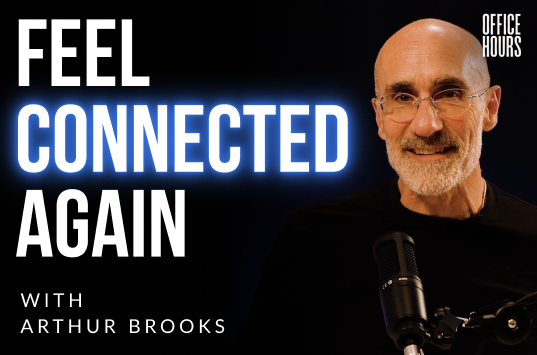Want to make your own morning protocol? Download Arthur’s guide to help you get started.
How you start your morning sets the tone for your whole day. In this episode of Office Hours, I share the science and habits behind my “Mad Scientist” morning routine, a six-step protocol I use to lower negative affect, boost positive mood, and make mornings a time of focus and flow.
I introduce the Positive and Negative Affect Schedule (PANAS), explain why morning mood matters, and show you the research-backed habits I use to improve mine.
In this episode, I cover:
• Why your morning starts the night before with an early bedtime
• How witnessing the sunrise can help manage poor morning moods
• The reason I don’t use the alarm clock on my phone
• Why I exercise first thing
• How to build a grounding spiritual or reflective practice (even if you’re secular)
• Why delaying your morning coffee can improve focus and energy throughout the day
• The high-protein, tryptophan-rich foods I eat for breakfast
• Why you need to protect your most productive hours of the day
• Listener questions on staying compassionate while protecting yourself and whether anger is linked to unhappiness
We’d love to hear any feedback you have. Please email us at officehours@arthurbrooks.com. And please leave a review on Apple or Spotify. Thanks for listening!
Brought to you by:
• AG1—Support whole body health around the clock. Get a free Welcome Kit, including a bottle of Vitamin D and 5 AG1 Travel Packs (a $76 value), when you subscribe.
• The Pump Club—Finally, fitness you can trust. Join The Pump Club—created by Arnold Schwarzenegger—for custom workouts and nutrition, habit building, and community—all for 50% OFF the monthly price with the code officehours at checkout.
Referenced:
• Leadership and Happiness course
• The Happiness Files: Insights on Work and Life
• Development and validation of brief measures of positive and negative affect: The PANAS scales
• Brahma Muhurta: Everything you need to know
• Influence of early rising on performance in tasks requiring attention and memory
• A controlled study of dawn simulation in subsyndromal winter depression
• The Lie We Tell Ourselves About Going to Bed Early
• Exercise effects on depression: Possible neural mechanisms
• Zone 2 cardio: What is it and why is it trending online?
• 9 Benefits of Walking After Eating
• How Does Prayer Help Manage Emotions?
• Global and regional alterations of hippocampal anatomy in long-term meditation practitioners
• The experience of flow and subjective well-being of music students





.png)
.png)